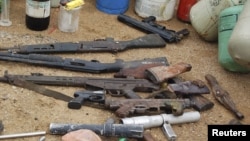ABUJA, NIGERIA —
After recent reports that security forces killed the spokesperson for the group, Abu Qaqa, and arrested two other militants, the government is wary to claim a victory. The stories in the news are conflicting, with most of the information coming from anonymous sources. Many former government 'victories' against the militant group have later turned out to be falsely reported.
At the beginning of February, Abu Qaqa reportedly was arrested. A few days later a man calling himself Abu Qaqa called journalists and said they got the wrong guy. Officials said Abu Qaqa is actually a pseudonym, making the identity of the man even harder to ascertain.
One official told the Reuters News Agency he did not want to say it was the Boko Haram spokesperson. "You might say the man killed is Qaqa, then the next moment you hear another Qaqa on air,” he said.
Groups proves to be deadly, disruptive
Boko Haram calls itself "The People Dedicated to the Teachings of the Prophet and Jihad," and has been blamed for about 1,400 deaths since it began operations in 2009. The group has claimed responsibility for attacks on markets, government buildings, security forces and media houses, and says its goal is to establish Islamic law and free imprisoned members.
Meanwhile, the attacks continue in the Muslim-majority north of Nigeria.
From his hospital bed in the northern Bauchi State, a man named Bala said he was playing cards when gunmen pulled up on motorcycles and opened fire.
He said he was lucky to get out alive, later telling a VOA reporter he saw gunmen spray bullets at the bodies to make sure they were dead.
No one has claimed responsibility for this attack, which killed at least six people, but locals say it similar to other attacks blamed on Boko Haram.
Rampant insecurity exacerbates other problems
Security analyst Wilson Esangbedo agrees with many saying that instability in Nigeria’s north is partially a product of widespread poverty and joblessness. But, he said, Nigerian President Goodluck Jonathan was correct to assume that it also is partly caused by political players who want to see the administration fail.
“All the things that are happening is geared to make sure that he’s not getting an opportunity to make a difference. Even the ‘transformation agenda’ of the present administration will come to naught if there is insecurity in the land," said Esangbedo.
And if the goal is to cause havoc in the north, Esangbedo said it is working.
The state justice department in neighboring Borno State reports that it suspects Boko Haram of killing its top lawyer, State Attorney General Zanna Malam Gana.
Meanwhile, Nigeria’s largest mobile phone provider also reporting new security problems. It says its service is compromised after an attack on their towers in the northeast. This comes less than two weeks after Boko Haram issued a press release from an untraceable email taking responsibility for other cell phone tower attacks.
At the beginning of February, Abu Qaqa reportedly was arrested. A few days later a man calling himself Abu Qaqa called journalists and said they got the wrong guy. Officials said Abu Qaqa is actually a pseudonym, making the identity of the man even harder to ascertain.
One official told the Reuters News Agency he did not want to say it was the Boko Haram spokesperson. "You might say the man killed is Qaqa, then the next moment you hear another Qaqa on air,” he said.
Groups proves to be deadly, disruptive
Boko Haram calls itself "The People Dedicated to the Teachings of the Prophet and Jihad," and has been blamed for about 1,400 deaths since it began operations in 2009. The group has claimed responsibility for attacks on markets, government buildings, security forces and media houses, and says its goal is to establish Islamic law and free imprisoned members.
Meanwhile, the attacks continue in the Muslim-majority north of Nigeria.
From his hospital bed in the northern Bauchi State, a man named Bala said he was playing cards when gunmen pulled up on motorcycles and opened fire.
He said he was lucky to get out alive, later telling a VOA reporter he saw gunmen spray bullets at the bodies to make sure they were dead.
No one has claimed responsibility for this attack, which killed at least six people, but locals say it similar to other attacks blamed on Boko Haram.
Rampant insecurity exacerbates other problems
Security analyst Wilson Esangbedo agrees with many saying that instability in Nigeria’s north is partially a product of widespread poverty and joblessness. But, he said, Nigerian President Goodluck Jonathan was correct to assume that it also is partly caused by political players who want to see the administration fail.
“All the things that are happening is geared to make sure that he’s not getting an opportunity to make a difference. Even the ‘transformation agenda’ of the present administration will come to naught if there is insecurity in the land," said Esangbedo.
And if the goal is to cause havoc in the north, Esangbedo said it is working.
The state justice department in neighboring Borno State reports that it suspects Boko Haram of killing its top lawyer, State Attorney General Zanna Malam Gana.
Meanwhile, Nigeria’s largest mobile phone provider also reporting new security problems. It says its service is compromised after an attack on their towers in the northeast. This comes less than two weeks after Boko Haram issued a press release from an untraceable email taking responsibility for other cell phone tower attacks.





